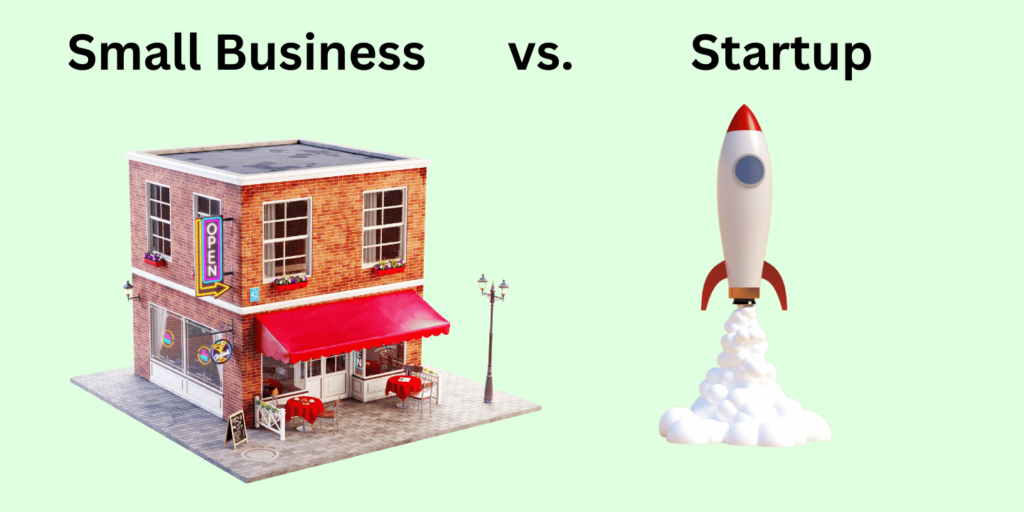Startup vs. Small Business: The Difference?
Understanding the differences between startups and small businesses is crucial in today’s cutthroat business environment. Although occasionally used similarly, these phrases refer to corporate endeavors with distinctive characteristics, objectives, and strategies. This blog defines these distinctions by examining the associated challenges, opportunities, strategies and success factors.
I. Defining Startups and Small Business
To establish a clear understanding, let’s delve into the definitions and critical attributes of startups and small businesses.
Startups:

Startups are newly established businesses aiming to disrupt existing markets or create new ones through innovative products, services, or business models. They operate in fast-paced and dynamic industries, such as technology, where rapid growth and scalability are prioritized. Another key point, startups typically seek significant external funding from investors to fuel their growth, aiming for a substantial return on investment. Specifically, innovation, experimentation, and a high level of uncertainty are characteristics of the startup environment.
Small Businesses:

In contrast, small businesses are typically more traditional and focus on meeting local market demands. They provide specific products or services to a well-defined customer base within a particular geographical area. Unlike startups, small businesses have a slower growth trajectory and prioritize steady and sustainable growth. Moreover, financing for small companies often comes from personal savings, loans, or bootstrapping. All in all, profitability and stability within the local market are primary objectives.
The Distinctions:
The primary distinctions between startups and small businesses lie in their objectives, growth strategies, and operational approaches. Startups are driven by disruptive innovation, scalability, and the pursuit of new market opportunities. They prioritize growth and seek external funding to achieve rapid expansion. Conversely, small businesses focus on local market presence, customer relationships, and profitability, often emphasizing stability and longevity.
Therefore, understanding these definitions and distinctions is crucial as they set the foundation for analyzing each context’s challenges, opportunities, and success factors. We will delve deeper into these topics in the parts that follow to provide readers with a complete grasp of startups, small businesses, and their routes to success
II. Challenges and Opportunities – Startups & Small Business
A. Challenges faced by startups:
1. Market validation and traction:
Startups often encounter the challenge of validating their business model and gaining traction in the market. They face uncertainty regarding whether their product or service will resonate with customers and generate sufficient demand. Hence, this requires conducting thorough market research, understanding customer needs, and iterating their offerings based on feedback.
2. Uncertainty and risk:
The dynamic nature of startup environments introduces high uncertainty and risk. As a matter of fact, startups operate in rapidly evolving industries where market conditions, customer preferences, and technology advancements can change quickly. Hence, navigating this uncertainty requires adaptability, resilience, and the ability to pivot strategies as needed.
3. Competing in dynamic and competitive environments:
Startups operate in highly competitive environments, often competing against established players and other startups with similar ideas. Differentiating themselves and gaining a competitive edge can be challenging. Therefore, startups must develop unique value propositions, leverage innovative technologies, and execute effective marketing and customer acquisition strategies to stand out.
B. Opportunities for startups:
1. Disrupting industries and introducing innovation:
Startups can introduce innovative products, services, or business models. They can challenge existing market players, change the status quo, and create new value propositions for customers. This disruptive potential allows startups to capture market share and reshape industries.
2. Rapid growth and scalability potential:
Unlike small businesses, startups emphasize rapid development and scalability. By leveraging innovative technologies, efficient processes, and external funding, startups can scale their operations quickly and potentially achieve exponential growth. Moreover, this scalability enables them to capture larger market shares and attract further investment.
3. Capitalizing on emerging trends and market needs:
Startups are well-positioned to capitalize on emerging trends and evolving market needs. They are adaptable enough to recognize market insufficiencies and develop solutions. Additionally, startups can acquire a competitive edge and generate the considerable potential for success by keeping up with industry trends and responding fast to shifting customer expectations.
C. Challenges faced by small businesses:
1. Limited resources and access to financing:
Small firms frequently struggle because they have few financial and human resources. They may have constrained budgets, making investing in growth initiatives or accessing external funding difficult. Hence, small businesses must carefully manage their resources and explore creative ways to fund their operations.
2. Local competition and market saturation:
Small businesses often compete with companies offering similar products or services in localized markets. Hence, market saturation is bound to pose challenges. Therefore, it becomes crucial for small businesses to differentiate themselves and build strong customer relationships to stand out in their communities.
3. Differentiation and maintaining a competitive edge:
Differentiating a small business from competitors can be challenging, mainly when operating in crowded markets. Therefore, they must find unique selling propositions, emphasize their personalized customer experience, and offer additional value to attract and retain customers. Not to mention, maintaining a competitive edge requires continuous improvement and adapting to changing market dynamics.
D. Opportunities for small business:
1. Building strong customer relationships and loyalty:
Small businesses can develop strong customer relationships and foster loyalty within their local communities. Additionally, they can cultivate a loyal customer base that supports their long-term success by providing personalized experiences, excellent customer service, and building a reputation for trust and reliability.
2. Agility and adaptability to changing customer preferences:
Small businesses can quickly respond to changing customer preferences and adapt their offerings accordingly. Unlike startups, small businesses can be agile in implementing changes and tailoring their products or services to meet specific local demands. This agility allows them to capitalize on emerging trends and maintain customer satisfaction.
3. Contribution to the local economy and community development:
Small businesses significantly contribute to the local economy and community development. They create enormous employment opportunities.
III. Success Factors and Strategies – Startups & Small Business
A. Strategies for startup success:
1. Market research and validation:
Startups must conduct thorough market research to identify their target audience, understand customer needs, and validate their business idea. This involves gathering feedback, testing prototypes, and iterating based on market response. Without a doubt, by continuously refining their product-market fit, startups can increase their chances of success.
2. Building a solid team and secure funding:
A talented and dedicated team is crucial for startup success. Founders should prioritize assembling a diverse group with complementary skills and a shared vision. Additionally, securing funding is vital to support growth and development. Startups must create effective business plans and pitch their ideas to potential investors or seek alternative funding sources such as grants or accelerators.
3. Continuous innovation and learning:
Innovation is the lifeblood of startups. Embracing a constant learning and experimentation culture allows startups to adapt to evolving market needs and stay ahead of the competition. Thus, by fostering a mindset of innovation, startups can identify new opportunities, improve their products or services, and drive sustainable growth.
B. Strategies for small business success:
1. Local marketing and community involvement:
Small businesses should focus on targeted local marketing strategies to reach their specific customer base. This can include leveraging community events, establishing partnerships with local organizations, and utilizing online and offline marketing channels that resonate with the local community. Not to mention, community involvement activities can also help build brand reputation and customer loyalty.
2. Operational efficiency and cost management:
Small businesses often have limited resources, making operational efficiency crucial. However, they can maximize their profitability and ensure long-term sustainability by streamlining processes, optimizing workflows, and managing costs effectively. All in all, implementing technology solutions and automating repetitive tasks can help improve efficiency and reduce operational expenses.
3. Customer-centric approach and personalized services:
Small businesses have an advantage in providing personalized customer experiences. By understanding their customers’ unique needs and preferences, small businesses can tailor their offerings, provide exceptional customer service, and foster strong customer relationships. hence, making an extra effort to deliver memorable experiences can result in client loyalty and favorable word-of-mouth recommendations.
By implementing these strategies, startups and small businesses can enhance their chances of success. However, it is essential to remember that these tactics are not all-inclusive and that each company can face different challenges and problems. In general, the key to success is to continuously evaluate and adapt strategies based on market dynamics, customer feedback, and the evolving business landscape.
IV. Conclusion
Understanding the distinctions between startups and small businesses is crucial for aspiring entrepreneurs in the ever-evolving business landscape. While startups focus on disruptive innovation, rapid growth, and scalability, small businesses prioritize local market presence, customer relationships, and profitability. Therefore, by recognizing the unique challenges and opportunities associated with each path, entrepreneurs can make informed decisions and develop strategies for success.
Startups face challenges such as market validation, uncertainty, and intense competition. However, they also have the opportunity to disrupt industries, achieve rapid growth, and capitalize on emerging trends. As a result, success for startups lies in conducting market research, building solid teams, securing funding, and fostering a culture of continuous innovation and learning.
Small businesses encounter limited resources, local competition, and differentiation challenges. However, they benefit from forming trusting bonds with clients, responding rapidly to shifting client tastes and promoting the local economy and community growth. In general, strategies for small business success involve local marketing, operational efficiency, and a customer-centric approach.
Ultimately, startups and small businesses play vital roles in the business ecosystem. The success of startups contributes to industry innovation and economic growth, while small businesses create local employment opportunities and support community development. Each path offers unique opportunities to make a meaningful impact in the market and the community.
Aspiring entrepreneurs should carefully consider their goals, resources, and risk tolerance when choosing between the startup or small business route. By studying, challenging limits, and creating the framework for a lifetime of learning, entrepreneurs can leave a positive legacy on the world.
If you liked this post, please consider reading our post regarding Entrepreneurship Lessons here.




